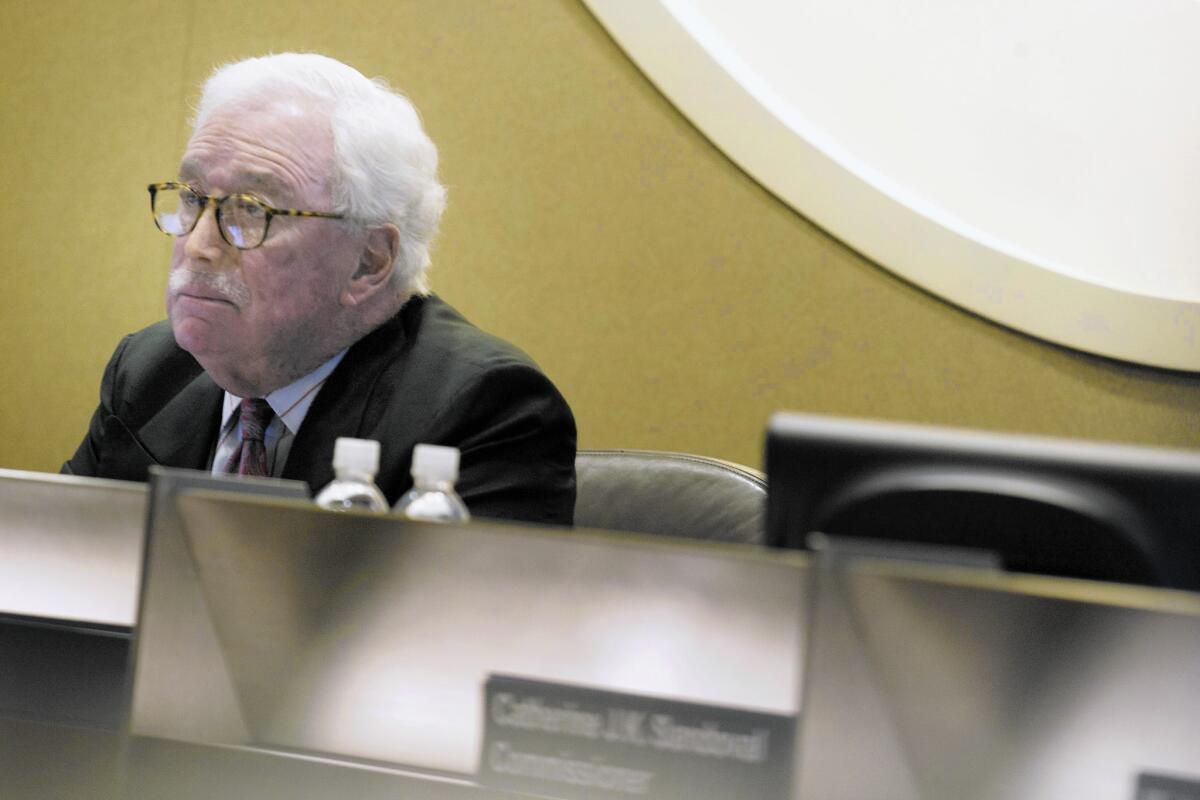PUC’s Peevey pushed terms of 2003 SDG&E energy deal, lawyer testifies

The then-president of the Public Utilities Commission strong-armed a deal that forced a San Diego utility to buy more than $700 million in “costly and unneeded” power from a private generating company, state lawmakers were told Wednesday.
Senate testimony came from Kelly Foley, a former lawyer for an affiliate of San Diego Gas & Electric Co.’s parent, Sempra Energy. She recounted a 2003 telephone conference call in which then-President Michael Peevey sketched out the power deal that eventually resulted in the purchase.
Buying the extra power constituted overkill, she said.
Foley’s remarks came as the state Senate Energy, Utilities and Communications Committee heard testimony about deal making and improper contacts between the PUC and the state’s power companies. Peevey, who served for 12 years as president of the PUC, has been frequently criticized for his domineering management style and emails and other communications with utility officials. A legislative staff report recommended restrictions and increased public disclosure of such meetings.
SDG&E defended the purchase. In an emailed statement, the San Diego utility said the purchase proved “valuable” in meeting customers’ needs for reliable electric service. The company, said spokeswoman Jennifer Ramp, “made all appropriate filings” with the commission about meetings with regulators. Other participants in the phone conference could not be reached for comment.
At issue in 2003 was whether the PUC should allow Sempra to sell a power plant in Escondido to SDG&E. Peevey, however, placed a condition on the sale: The utility must also sign a contract to purchase more electricity from another local power plant at Otay Mesa on the Mexican border, owned by CalPine Corp.
Administrative Law Judge Carol Brown, who participated in the conference call, wrote the proposed decision favoring the deal. The controversial agreement won final approval on a 3-2 vote of the commission, with Peevey casting the deciding vote, Foley recalled.
Brown, who recently served as Peevey’s advisor before returning to her judge’s job, could not be reached for comment. PUC spokeswoman Terrie Prosper declined to respond to Foley’s testimony.
“President Peevey ran the call,” Foley said. She said that to her knowledge, neither the utilities nor the power companies filed any legally required notice “or any other public disclosure of the events of the conference call.” She said that the recent scandal involving improper communications at the PUC compelled her to recount the events of a dozen years ago.
Such notices of one-sided communication with commissioners and top staff are mandatory in many proceedings at the PUC. The purpose of filing what lawyers call “ex parte communications” is to ensure that all parties with a stake in a PUC decision, including utilities, ratepayers, environmentalists and community groups, get equal access to decision makers.
The need for tighter PUC control over improper communications is the central issue in an unfolding scandal at the powerful regulatory agency. The “backroom deals” and “overly cozy” contacts between utility brass and PUC bosses are the target of criminal investigations by the U.S. Department of Justice and the California attorney general.
Wednesday’s hearing was the second of three hearings on improper communications between utilities and regulators.
A report by committee staff outlined recommendations for the PUC to tighten its rules to make commissioners themselves publicly report any conversations with utility executives.
The recommendation comes in the aftermath of the release of embarrassing emails and other accounts of chummy meetings, meals and contacts between Pacific Gas & Electric Co. executives and PUC commissioners and staff.
The committee recommends that such contacts be banned completely in many cases, including “adjudicatory, rate setting and rule making proceedings that are contested and rely on critical factual assumptions.”
Twitter: @marclifsher







